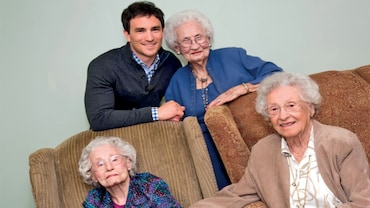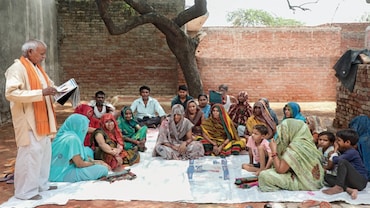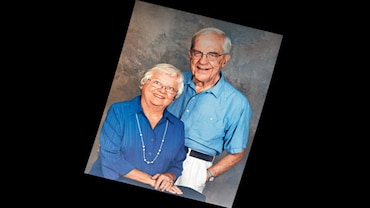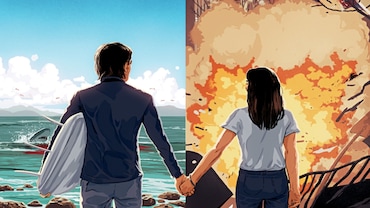- HOME
- /
- True Stories
- /
- My Story
- /
The Great Unknown
An unlikely friendship helped my son grapple with divorce, death and …
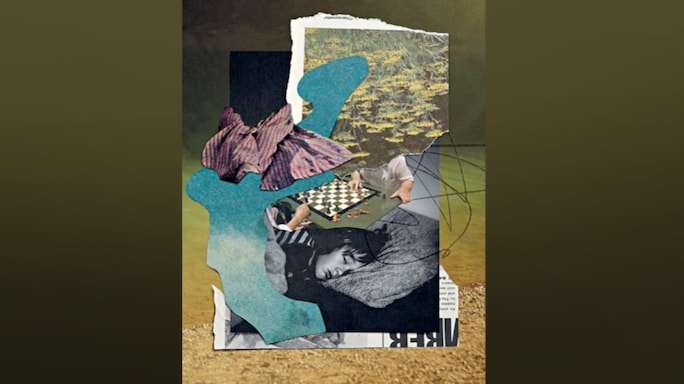 Illustration by Nikki Ernst
Illustration by Nikki Ernst
The apartment my son, Hugo, and I moved into after my divorce was nice, but the feeling we had was of holding on to a raft in angry waters. We were now about a 30-minute drive from Hugo’s dad’s new Toronto home. During the first week eight-year-old Hugo stayed with me there, he responded to the change in his life by trashing his room before finally letting tears come and allowing me to hug him.
At that time, he also developed a new fear—the fear of death. “I can’t sleep. I am thinking about death,” he would say when I would catch him with his eyes wide open, in the darkness of his bedroom, his little body tightly surrounded by a cordon of stuffed toys.
Hugo had always considered himself an atheist, ever since his dad had told him at age four that God, like Santa, wasn’t real—and that when we die, we turn to dust. For Hugo, it had been just something to say to make adults laugh and confuse his innocent buddies in kindergarten.
But now that he was growing up, he was grasping the concept of time, that he was slowly but surely moving toward the big unknown. I think his fear of death also came about because nothing seemed certain anymore: Our little family was no longer a unit, and our lives were divided into split-custody homes. When the nights got too hard for Hugo, we’d fall asleep holding on to each other like two monkeys, and all the unknowns stayed away for one more night.
That same year, I’d started going to a new addictions group that met twice a week. The group was a safe place where no hard topic was off the table. The best conversations would often happen after our meetings were over; my favourite person to talk to was Denis, an 80-year-old contrarian and cancer survivor who was considered by everyone else in the group to be a grump.
At the end of each meeting, we were supposed to stand up and hold hands. I would do this even though it made me uncomfortable—I disliked the forced intimacy—but Denis refused. Like a broken link in a circle, he stood with his hands folded, and it was this little rebellion that made me trust him.
He was one of the first people I confided in about my divorce. His pragmatic response and lack of sentimentality—“It sucks now, but it will get better”—helped me gain perspective on my grief. I knew that Denis had gone through hardships, his recent cancer being one, and yet he had a healthy, no-nonsense attitude that inspired me.
I was not the only person taken with Denis—my son became an instant fan when they met at a celebration of my one year of sobriety. As we socialized while balancing our slices of cake on flimsy Styrofoam plates, Hugo was polite and charming, but he felt the adults were talking down to him and he was squirming to leave. That is, until Denis introduced himself, shaking his hand and asking Hugo what he thought about the “bad cake.”
Hugo said he thought the cake was fine and then pressed Denis about why he didn’t hold hands at the end of the meetings, a detail I’d shared with Hugo.“I’m not in kindergarten,” Denis said, and my son chuckled. Then they talked about being atheists, because Denis remembered from my stories about my precocious kid that this was something they had in common. He told Hugo that he’d never met an eight-year-old atheist before.
“I’ve never met an 80-year-old atheist before,” Hugo deadpanned, and Denis erupted in laughter.
From that time on, the two would ask for updates about each other (“Denis got a new camera to take his bird-watching to the next level”; “Hugo has finished all the Harry Potters.”). The updates included, eventually, a devastating one when Denis’s cancer came back.
I explained to Hugo that his octogenarian buddy was staying at the hospital now, and said I was going to visit.
“Is he going to die?” Hugo asked.
“Yes,” I told him.
“Soon?”
“Sooner rather than later. Before the summer is over,” I answered. I spoke gently but firmly, feeling my throat clenching a little as I held back tears.
Maybe I was harsh, but I had a vague notion of wanting to teach my son about death, of showing him that death, like friendship (or love that ends in a divorce), was part of life. I hoped that, by nurturing a relationship between Denis and Hugo, I could normalize this terrifying thing for my kid, who still worried about his own end.
Hugo’s big brown eyes searched my face, his forehead scrunching as he said quietly, “Okay. Can I visit him?”
And so he did. On our way to the hospital, Hugo insisted on getting a gift. What do you get a grumpy old man whose only request was, at its most extravagant, a coffee? A sparkly stuffed dragon, of course—the perfect gift, we joked, for someone with such a sparkly demeanour.
Denis was amused and proudly displayed the dragon next to a stuffed elf someone else had given to him, also as a joke. He let Hugo have his hospital pudding. We went into the common room and played a card game, with Hugo writing down scores on a sheet of paper. He’s always loved numbers and charts and strategy.
“We should play chess,” Denis said. “Do you play chess?”
“No, but you can teach me,” Hugo allowed.
Denis pretended to be appalled, “If I have to,” he said. “What kind of person doesn’t play chess?”
I set up visits with Denis every Sunday, always bringing my son with me. We ate snacks while they played chess, and we talked about Denis’s wild adventures as a farm labourer before he became a lawyer in his 50s, “just to see what that was like.” Denis never talked about his cancer, but Hugo had said more than once that maybe the doctors had made a mistake. He thought Denis seemed totally fine.
Except he wasn’t. He’d long walked with a cane, but that gave way to a walker, which then became a wheelchair. Eventually, Denis was moved to a palliative care facility.
Hugo’s only comment on the new location, which he called the “dying hospital,” was that it didn’t seem like anyone was dying in it. Compared to the previous hospital, which was surrounded by the concrete of downtown and filled with fragile people in hospital gowns, this place was bright and clean and not depressing at all. From Denis’s windows, we could view a sprawling hill of trees and bushes, and grounds dotted with fountains.
Once, feeling particularly sparkly, Denis convinced us to head out for tacos at a cheap street-food joint a 10-minute walk away. That took us half an hour; he allowed Hugo to push him all the way there. It wasn’t an easy task, as the wheelchair kept getting jammed in the tram rails.
But Denis felt proud to treat us, and my kid put on a show of pretending to dine as if in a fine restaurant, bending his plastic utensils in ridiculous ways as he tried to cut up the tacos.
As Denis’s health deteriorated, we didn’t talk about his illness or the fact that he was going to die soon or what it all meant. But eventually we had to deal with the issue of our last visit—the one when saying goodbye would mean saying goodbye for good.
Hugo and I were scheduled to go to Europe for the rest of the summer. We brought him some coffee and then went up onto the rooftop terrace, where it was so windy that the chess pieces kept falling over.
Afterwards, Hugo pushed Denis down the long, bright hallways, sometimes running, and making one wild turn that caused Denis to huff loudly. Hugo kept forgetting that his friend was so fragile, and Denis didn’t have the heart to reprimand him.
We dropped him off in his room, and it was the first and the last time we hugged, stiffly—Denis’s disdain for physical contact taking a back-seat to this sweet, awkward moment.
And then we left. Hugo cried on the way home.
A month later, a relative of Denis’s called me while Hugo and I were on the Adriatic coast, the shimmering sea visible from the windows of our villa as I took the call. Denis had only days, maybe hours, left, they told us. He could no longer speak. After hanging up, Hugo and I decided we would record a voice mail for him. “What should I say?” Hugo wondered.
“What do you want to say?”
“I don’t know. Have a nice trip?” he said and laughed uneasily.
After we’d left a clunky message, he added, “But he’s an atheist, so he’s not even going anywhere.”
Two years later, in January 2020, Hugo’s beloved grandmother passed away, and he accepted her death stoically, quipping that he had had training in death with Denis.
I don’t know if my son’s sleepless nights went away because of those Sunday visits, but we did settle into our new life, despite all the uncertainty. Hugo no longer obsesses over death, although he has admitted that he’s still scared of the big unknown—but who isn’t?
And I’m not sure if he’s an atheist anymore, either. While replacing his phone this past Christmas, I found a couple of messages sent to his grandmother’s number, one reading: “Where are you?”
When I asked him about it, he said, “I was sad and I missed her. It was comforting.”
Like all parents, I try to soften blows and dispel myths and monsters, and I know that with Denis, I was trying to make death less scary, give it a human face or, even more straightforwardly, help him make friends with it.
I don’t know if Hugo texting his grandmother is a sign of a spell being broken. But I know that he understands now that people live on after they’re gone, and recognizing that is one way to make peace with the great unknown.



